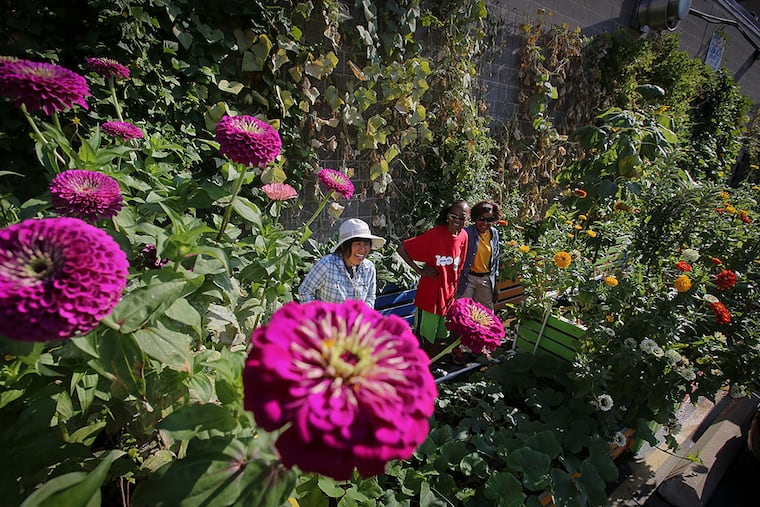A farm grows in Chinatown
It's not a secret garden. But people are still surprised to see it - sprouting from a parking lot, the vines climbing a cinder-block wall in Chinatown North.

It's not a secret garden.
But people are still surprised to see it - sprouting from a parking lot, the vines climbing a cinder-block wall in Chinatown North.
"I used to think it was just flowers when I walked by," said Joyce Randell, who lives not far away.
Set between a Shell station and a Catholic school, this small, corner-store-sized farm has big ambitions: to provide food to the homeless, purpose to the aimless, and satisfaction to everyone willing to get their hands dirty.
What a few months ago was barren blacktop has burst with color and greenery.
"Maybe it's the timing," said Meei Ling Ng, an artist who created the farm. "I always believe the timing in your life has to be right."
For her, the timing of the seasons matters most. Born and raised in Singapore, the daughter of a mother who grew orchids for a living, Ng came here for an arts education, graduating from the Art Institute of Philadelphia in 2000.
In recent years her installations - including a big, chicken-shaped coop to house, well, chickens - have aimed to raise awareness about city farming and sustainable living.
The new farm was born through hope and hoe - and an artist-in-residency program run by Asian Arts Initiative, which collaborated with the Sunday Breakfast Rescue Mission.
The mission is a city institution, founded in 1878 by businessmen including John Wanamaker; John B. Stetson, the hatmaker; and W. Atlee Burpee of seed fame. Today it provides meals, shelter, and addiction-recovery programs to homeless people.
The farm rises beside the mission near 13th and Vine, not far from a giant mural of Wilt Chamberlain, down the street from the future site of the tall Eastern Tower planned for Chinatown. The produce lands on mission dining-room plates, offering healthier meals with the freshest ingredients.
Ng wanted to show that people can grow food in unlikely places - even on a parking lot. She thought a community garden could offset some of the pressure of gentrification that's changing the area, and forge ties between groups of people who might not usually meet.
Grower groups jumped in to help, with donations of equipment and expertise coming from the Pennsylvania Horticultural Society; Philadelphia Orchard Project; City Harvest; and Urban Jungle, the South Philadelphia firm that specializes in creating gardens on vertical surfaces.
North Chinatown lost its last shared garden decades ago, in the 1970s, with the construction of the Vine Street Expressway. More recently, a small Chinatown farm run by Asian Americans United gave way to a parking lot.
The new farm took root last winter, when Ng led the mission Overcomers Program - made up of men trying to beat addictions - in planting the first seeds in indoor pots. In spring those seedlings moved into big, outdoor planters, built with wood reclaimed from shipping pallets.
Since the first harvests in March, the farm has produced nearly 800 pounds of food - squash, cucumbers, kale, basil, strawberries, eggplant, tomatoes, beets, blueberries, cucumbers, and figs.
A plot of corn produced 900 ears. Flowers bloom by the dozens. There's even an apple tree.
"The farm is in high gear right now," said Nancy Chen, senior programs manager at Asian Arts Initiative.
It's also at a crossroads.
The goal is to make the farm permanent. But Ng can't stay forever. And the reality is that the core of the workforce - the men at the mission - tend to come and go. When those most involved in the farm depart, they take needed skills and know-how with them.
"I have to reteach," Ng said.
Some novice farmers have stuck from the start.
"All the hard work was worth it," said Will Brown, 55, who shed a heroin addiction and last week prepared to graduate from the 12-month Overcomers Program. "There's a peace in the greenery. When I would get stressed, I would come out to the plant area and chill out."
Urban farming isn't new - city dwellers planted "Victory Gardens" on rooftops 70 years ago during World War II - but its scope has grown leaf over stem. Today urban farms rise in all corners of the nation.
Philadelphia has been a leader.
In 2010, the city had 571 community gardens. By 2014, that number had grown 70 percent, to 970, according to the Trust for Public Land.
Last year Philadelphia ranked 14th among big American cities, having 6.2 gardens per 10,000 residents. First was Washington, with 40.1, followed by Portland, Ore., at 35.7.
Worldwide, an estimated 800 million people practice urban agriculture, mostly to save money and ensure that they have food, according to the United Nations. In the United States, city farming is driven more by personal outlook, by the belief that producing and consuming locally grown food is a positive, human- and Earth-friendly endeavor.
On a recent day, in the glare of a hot morning sun, Ng moved carefully through the rows of boxed plants, checking their health. The growth was thick.
"Her vision came true," said Valerie Marshall, a retired teacher who travels from Ardmore to work as an apprentice.
Randell, also retired from teaching, signed on as an apprentice farmer, too.
The challenge now is not to create but to sustain. Heat from the asphalt can sap the plants. The farm needs equipment to collect rainwater. A consistent workforce must develop.
Sometimes fruits and vegetables disappear off the vine overnight. But, the growers figure, if people need the food badly enough to steal, then better they take it.
"The spirit of what we're trying to do with the farm is build for this neighborhood, and have people from the neighborhood be involved," Chen said, "and be involved in passing the torch."
215-854-4906
@JeffGammage